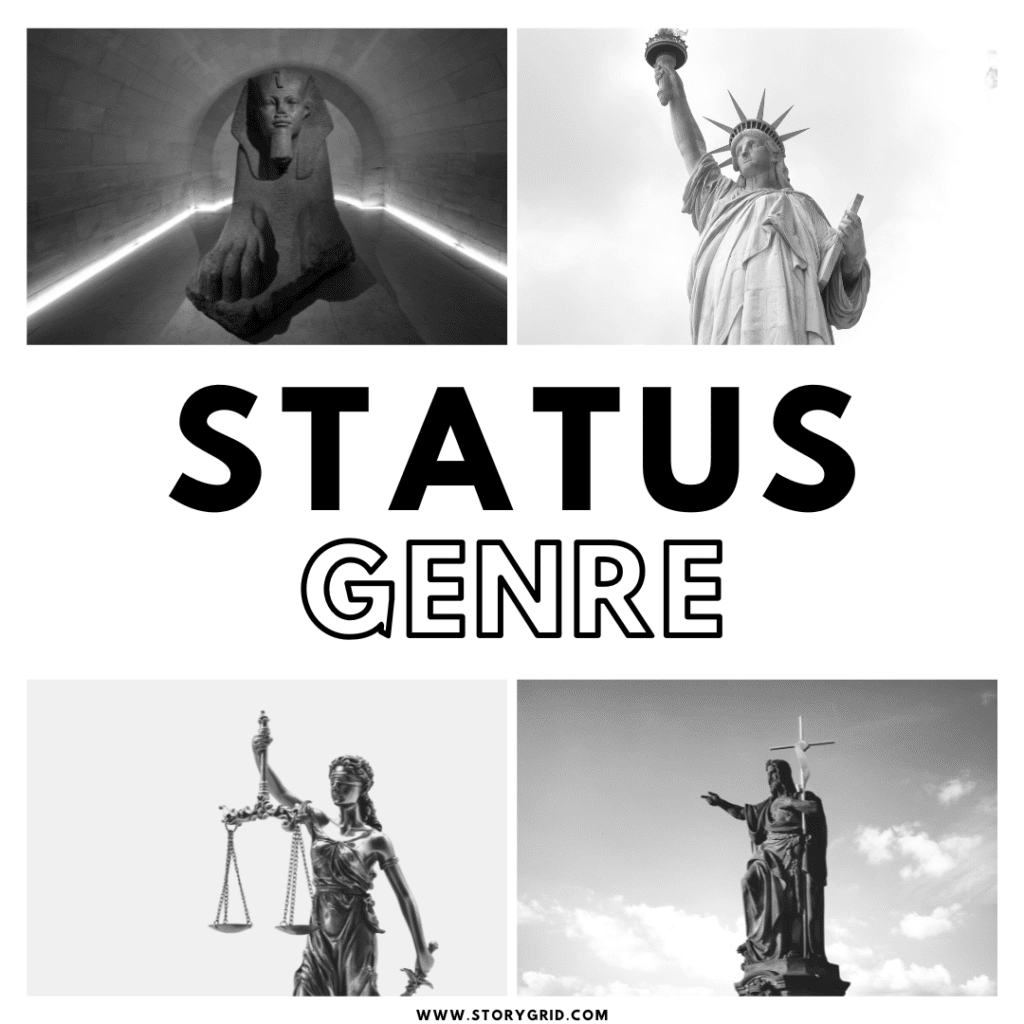What is the Status Genre?
An internal story in the Status genre focuses on the protagonist’s need for respect. These stories turn on the failure / success spectrum while generating feelings of admiration or pity in the reader, depending on the outcome.
The underlying question in every Status story is:
Will the protagonist be able to find satisfaction and achieve society’s definition of success, or will they discover and embrace their personal definition of success and stay true to their values?

What is the Controlling Idea of the Status Genre?
The universal theme or CONTROLLING IDEA of a Status story is:
Staying true to one’s own values, whether or not this leads to social betterment, defines success. But if one sells out—exchanging their values for meaningless rank, praise, or acquisitions—the result is failure.
The Four Core Framework of the Status Genre
The FOUR CORE FRAMEWORK helps us meet reader expectations by bringing the core of our story into focus to create an irresistible, memorable, and shareable experience for the reader.
1. Core Need
Respect
The core need of the protagonist in a Status story is respect, especially from other AVATARS, without abandoning their values.
The protagonist seeks satisfaction—personally or professionally—while experiencing good and bad fortune. Tension arises when the protagonist faces opportunities or misfortunes that tempt them to abandon their values.
2. Core Value
Failure to Success
The core value derived from the need for respect spans failure and success and gradations between and beyond. The negative end of the spectrum goes beyond failure to “selling out” and the positive movement can include compromise on the way to success.
3. Core Emotion
Admiration or Pity
If the protagonist stays true to their inner moral code and embraces their own definition of success rather than that of the external power structure, readers feel the core emotion of admiration, but if the protagonist sells out or fails, the reader feels pity.
4. Core Event
The Big Choice
The CLIMAX of the Status genre is the Big Choice—when the protagonist decides to achieve success through the traditional power hierarchy (and thus sell out their personal values) or stay true to themselves and achieve internal success.
6 Conventions of the Status Genre
GENRE CONVENTIONS are specific requirements for the story’s ALTERNATE WORLD, AVATARS, and circumstances that create conflict and enable solutions. Conventions set up genre reader expectations. Without these, the reader will be confused, unsettled, or bored and quit reading.
The Status genre has six necessary conventions:
- Strong Mentor Figure (e.g., Fagin in Oliver Twist or Daddy Warbucks in Annie).
- Big Social Problem as subtext (e.g., Racism, Misogyny, Class)
- Shapeshifters as Hypocrites: secondary AVATARS say one thing and do another.
- The Herald or Threshold Guardian is a fellow striver who sold out.
- A clear Point of No Return/Truth Will Out moment when the protagonist knows they can never go back to the way things used to be.
- Paradoxical Win-But-Lose or Lose-But-Win bittersweet ending.
8 Obligatory Moments in the Status Genre
OBLIGATORY MOMENTS are the must-have events, revelations, or decisions and actions that pay off the raised expectations of the CONVENTIONS.
The Status genre has eight obligatory moments:
- An inciting opportunity or challenge.
- The protagonist leaves home (real or metaphorical) to seek their fortune.
- Forced to adapt to a new environment, the protagonist relies on old habits and suffers humiliation.
- The protagonist learns what the external antagonist’s OBJECT OF DESIRE is and sets out to achieve it.
- The protagonist’s initial strategy to outmaneuver the antagonist fails.
- During an All Is Lost Moment, the protagonist realizes they must change their definition of success or risk betraying their values.
- The Big Choice. The protagonist chooses to do what’s necessary to attain status or reject the world they strived to join.
- The protagonist is saved or lost based on their action in the Big Choice moment.
Status Genre Subgenres
The Status genre can be further broken down into four subgenres based on the protagonist’s situation:
- Pathetic: Weak protagonist tries to rise and falls. Tess of the d’Urbervilles by Thomas Hardy, Little Miss Sunshine (2006)
- Tragic: Striving protagonist makes a mistake that dooms him or her to failure. American Tragedy by Theodore Dreiser
- Sentimental: Weak protagonist succeeds against all odds. Brooklyn by Colm Tóibín, Rocky (1976)
- Admiration: Principled protagonist rises without compromise. Jane Eyre by Charlotte Brontë, Serpico by Peter Maas, A Little Princess by Frances Hodgson Burnett, Gladiator (2000)
“The Status story concerns a single protagonist’s quest to rise in social standing and the price he or she must pay in order to do so.”
— Shawn Coyne
Additional Resources for the Status Genre
- The Four Core Framework by Shawn Coyne (Portions of this article have been taken from this book.)
- The 5-Leaf Genre Clover
- Hamilton by Lin Manuel Miranda: A Story Grid Masterwork Analysis Guide by Abigail K. Perry